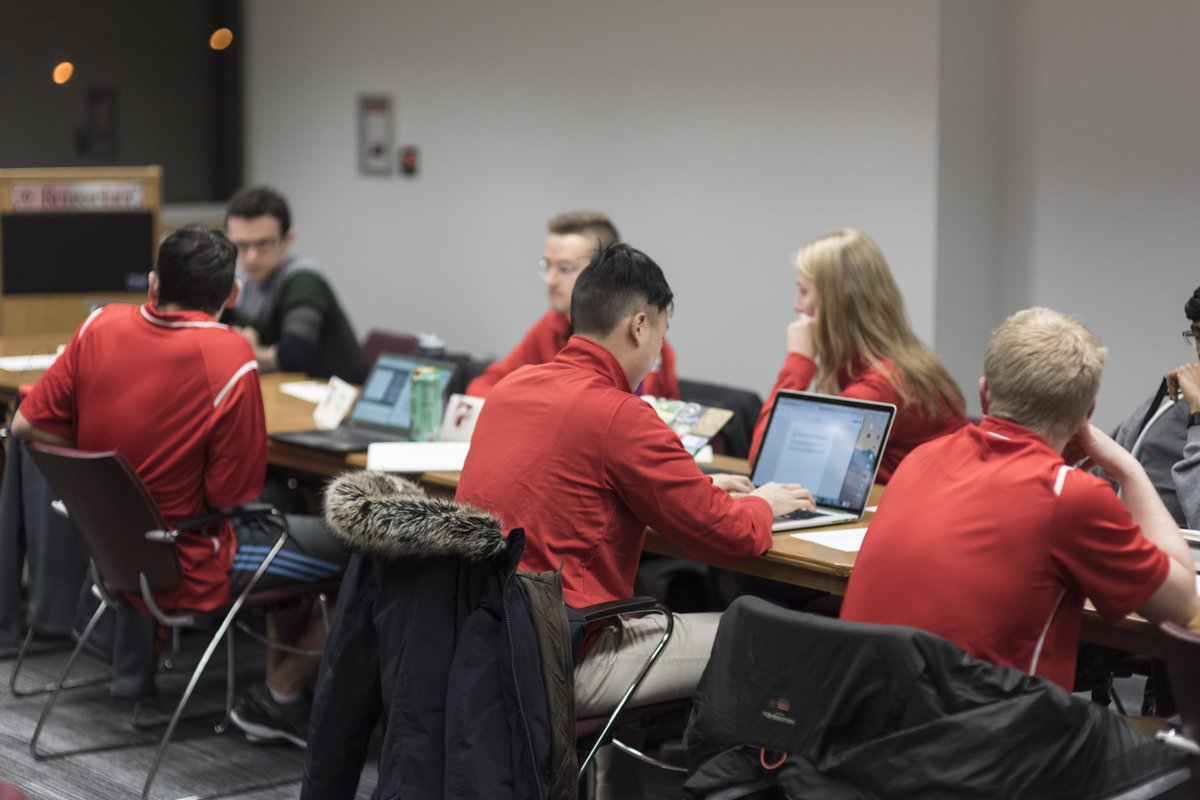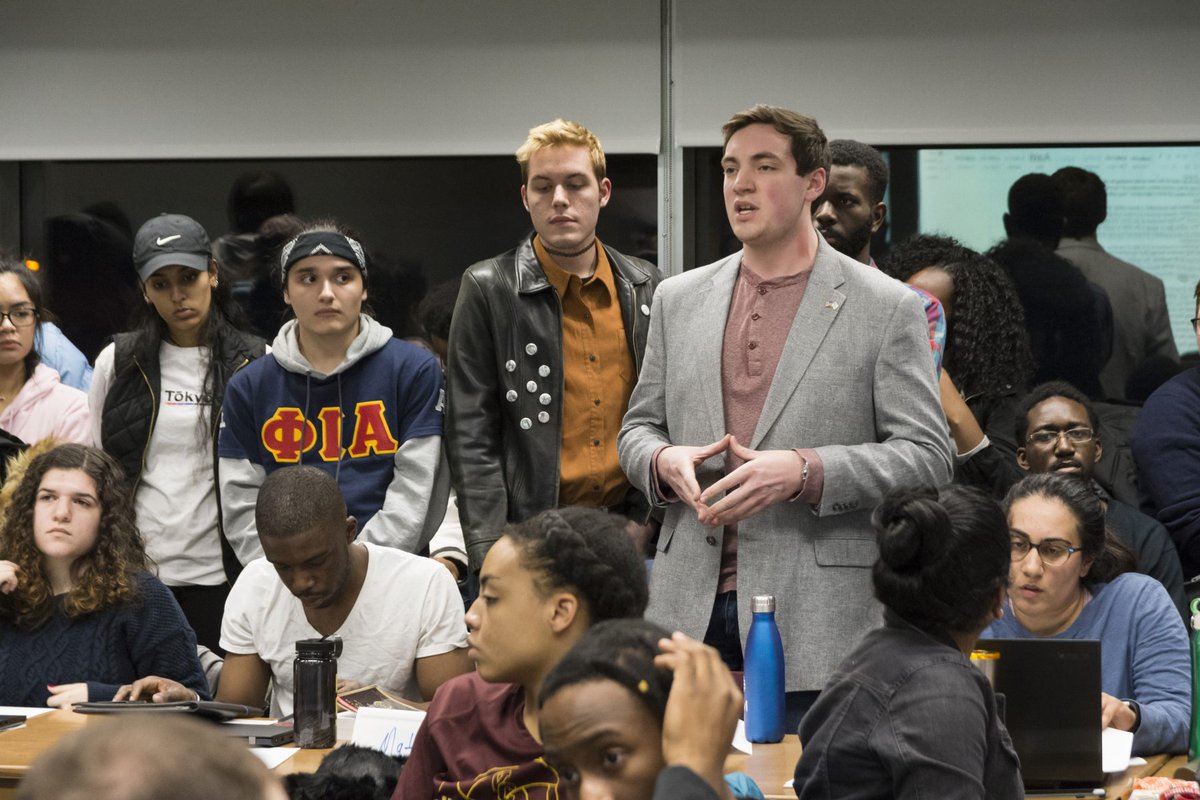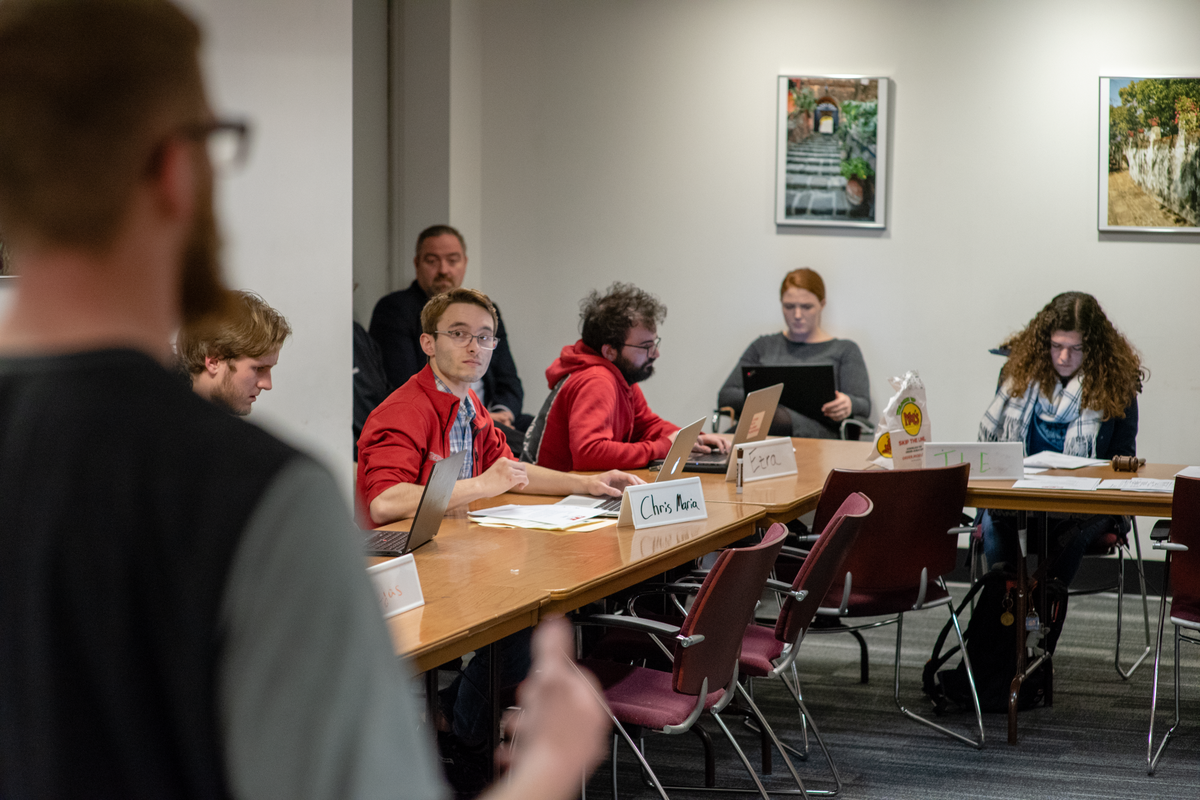Reflecting on the past year of Senate

In the last Student Senate meeting of the semester, each committee, as well as the grand marshal and vice grand marshal, presented their accomplishments and processes throughout their term, and the things they hope to continue in the future. The slides that were used for the presentations will serve as a source of knowledge for future committee members.
Academic Affairs Committee
The purpose of the AAC is to foster discussion with students, faculty, and administration to encourage new ideas that enhance the academic experience. They also work to facilitate creative thinking, and to provide students and faculty with improved resources to create the best educational environment. Its subcommittees consist of the Undergraduate Research Subcommittee—a subcommittee dedicated to connecting professors and students for research—a subcommittee focused on potentially getting the career fair to be a school holiday and increasing representation for niche majors, a Summer Arch Task Force, and a subcommittee working to create and implement an online tutoring program.
Facilities and Services Committee
This year the FSC was split up into four main categories: facilities, transportation, sustainability, and public safety. Those working to improve facilities in the Union worked on a study spaces proposal, which was continued from last year, as well as a project to bring the Capital Region Bike Share to campus. Within transportation, the committee worked with quite a few people on a route proposal to shorten the East Campus Shuttle route, adjust the West Campus Shuttle route, and create an infographic to show the differences between the three safety services on campus: the SafeRide program, the Public Safety escort system, and the late night weekend shuttle. For sustainability, it put together a composting proposal that was approved by the Senate; and are now waiting to work with next year’s hospitalities provider to implement it. It is also working to provide a more exciting Earth Week this year, and is continuing to push for more water bottle filling stations on campus. The main focus of the public safety branch of the FSC was the annual Light Walk, an event where members of the Senate walk around campus and off-campus areas to find and report safety concerns, that took place this year.
Student Life Committee
The goal of the SLC is to take in student feedback and channel it to appropriate committees, or work towards a solution within the committee itself. The on-campus pharmacy service is now available and the formation of a student health task force is still in progress. The student organization accountability program was modeled after the student peer alcohol monitoring program and the initial proposal has been written. The SLC is part of an ongoing conversation regarding the more controversial suggested changes to the Rensselaer Handbook of Student Rights and Responsibilities, and earlier in the year brought the more time sensitive suggested changes before the Senate for approval. They are also attempting to address a need for more summer storage on campus, which the next Senate will discuss.
Student Government Communications Committee
This year, Chairperson Stefanie Warner ’19 said that she wanted to focus on building the foundation for the committee due to issues that had existed in the past. The committee worked on the redesign of the Union logo, which was done to have a logo entirely designed and built by the student body. The monthly report was implemented as a way to get information out to the student body in a simplified way. The SLC worked to increase student government’s social media presence significantly, through initiatives like the Student Government Spotlight and Throwback Thursday.
Community Relations Committee
The CRC focused on several big projects this past year. The first was working to create new student flyers—an accumulation of all the information the typical student would amass over the course of their four years here at RPI—that could make the transition much easier for freshman and transfer students. They also worked on having a lupus walk and an autism fundraiser. In addition, they worked on bringing food trucks to campus, creating a website dedicated to volunteer efforts that RPI students can attend, and developing a centralized social calendar.
Hospitality Services Advisory Committee
The largest project that the HSAC has been working on in is the Fresh Pantry project, which makes it possible for students to sign up for a weekly meal plan pick up service. Modeled after Blue Apron, the prepackaged, semi-prepared kits of food would be available for purchase with Flex, RAD, cash, credit, or debit. It is currently expected to roll out the first day of classes in the fall.
Internal Reforms Committee
The loosely defined purpose of the IRC was to look into different ways of improving the Senate. They successfully accomplished the creation of a senator guide, which is intended to serve as a go to source of information for new and returning senators. They also did senator training, looked over the Union Constitution, and proposed five amendments. Two ammendments passed through the Senate and will be voted on April 5 during GM week elections. Chairperson Steven Sperazza ’18 put together several suggestions for the improvement of the Senate, which included an increase in input from campus organizations in regard to Senate-related matters and more efficient meetings made possible by more proactive discussions. Since the IFC was an ad hoc committee, it was suggested that it exist every few years to avoid redundancy.
Web Technologies Group
The goal of the Web Technologies Group is to help committees advance their goals and to work on some of its own projects to help the student body. One of its main projects was the improvement of the Shuttle Tracker, which was done in conjunction with RCOS. It now shows which routes shuttles are on, displays inclement weather alert messages, has reduced data usage, includes a legend, and has a dark mode. This semester, the committee made electronic nominations for GM week elections possible. It also handles surveys—through which thousands of responses were anonymously recorded—as well as petitions.
Union Annual Report Committee
The UAR Committee focused on producing the Union Annual Report. The Union activity fee came for recommendation and was approved after discussions about its split between undergraduate and graduate students that will be taken into account in next year’s budgeting. According to Grand Marshal Justin Etzine ’18, the report went very well and received many thankful comments about its quality.
Human Resources Interview Committee
The purpose of the HRIC was to vet the director of the Union candidates, conduct interviews, and provide a comprehensive recommendation to the Executive Board. Chairperson Michael Cuozzo ’17 said that the committee consisted of 16 members who met with two candidates. He said that during the process, students had several concerns, including the presence of administrators, the disruptive actions of the Division of Human Resources during the interviews, and the fact that the reporting of candidate feedback was done by HR. He addressed the incident in which one of the candidates was seen having the typed-out questions in front of him during the second interview round. He said that President of the Union Matthew Rand ’19 informed Vice President of Human Resources Curtis Powell, who maintains that the administration did not provide the questions to the candidate. Cuozzo recommended that in the future there should be more student involvement in the screening of resumes and in modifying the job description of director of the Union so that it conforms to tradition. He also suggested that there should be no administrators in the room during the group interview with students and that the committee should be re-established next term.
Elections Commission
The Elections Commission this year worked with WebTech to introduce electronic nominations for elections. Now, candidates enter their own nominations online. It also worked on the Freshman 2017 elections—which according to Chairperson Caleb Caraway ’19 went well and experienced a large increase in voter turnout—and the GM Week 2018 elections that are currently going on.
Vice Grand Marshal
Vice Grand Marshal Ellie Mees ’18 handled petitions this year, only one of which reached the necessary 250 signatures, to come before the Senate. It regarded bringing the Flying Chicken to campus and was charged to Senator Nancy Bush ’19. Mees discussed the Summer Arch Task Force that she put together and recommended continuing it next term. She also brought up her title change, which she said had sparked a heated debate, and explained that it was just for ease of understanding and not meant to change her responsibilities. Over her term she also held cabinet meetings—something that was previously done by the GM but was charged to her this year by Etzine. She also recommended that this continue into next term.
Grand Marshal
Etzine reminded everyone that members of the Senate serve to represent, pursue projects to the benefit of, and advocate for the interests of their fellow students. He said that over the course of the semester there has been a lot of improvement in the Senate’s professionalism and meeting efficiency. He then took the time to discuss student involvement; talking about huge improvements in the Fall 2017 survey, which boosted an over 60 percent increase in responses compared to last year. He praised what he called record-level participation on Senate committees, the full-scale implementation of a sub-committee structure, and student government’s expanded social media presence.

 Executive Board
Executive Board
 Executive Board
Executive Board